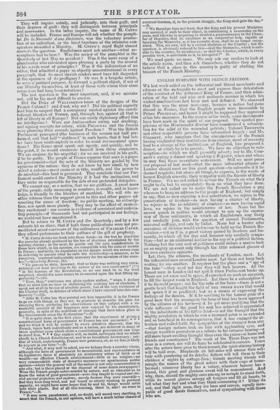ENGLISH SYMPATHY WITH FRENCH : FREEDOM.
WE last week called on the influential and liberal merchants and citizens of the metropolis to meet and express their detestation of the conduct of the dethroned King of France, and their admi- ration of the bold and wise and moderate manner in which his wicked machinations had been met and defeated. We observed that this was the more necessary, because a notion had gone abroad in France, that the English people were favourable to Prince POLIGNAC, and hence it might be supposed they approved of his late measures. In the course °rale week, some movements have been made in the spirit of our proposal. The spirited pro- prietors of the Westminster Review have commenced a subscrip- tion for the relief of the wounded patriots ; Colonel TnomPsoil and other respectable persons have subscribed largely ; and Mr. COBBETT, who imagines that the circumstance of the French having vindicated their institutions from change, must of necessity lead to a change of the institutions of England, has proposed a dinner, at which be is to preside. We have no objection to sub- scription—to which we shall presently advert; nor to Mr. COB- BETT'S eating a dinner and speaking a Register, when and where he may find theseavocations convenient. Still we must press our proposal of last week—that the more influential citizens of London should meet on this great question—to subscribe if it be deemed requisite, but above all things, to express, in the words of honest English sincerity, their sympathy with the friends of liberty in France. We are not called to lerAure the French on what they ought to do, but to congratulate them on what they have done. We are not called on to make the French Revolution a peg whereon to hang an address to the people of England; but simply to say, that as men enjoying a free constitution, we rejoice in the preservation of freedom—as men having a charter of liberty, we rejoice in the inviolability of charters—as men having equal laws, we rejoice in the maintenance of law. None but the merest quack in politics would attempt to mix up the expres- sion of these sentiments, in which all Englishmen may freely and cordially join, with the question of annual Parliaments, universal suffrage, and vote by ballot. None but a hunter after occasions of division would endeavour to hold up the French Re- volution—not as it is, a great victory gained by freedom and hu- manity, in which all the free and humane may cordially sympa- thize—but as an additional feather in the cap of a political faction. Nothing but the very soul of pettiness could induce a man to look on so mighty an event only through the little coloured glasses of his own exclusive opinions. Let, then, the citizens, the merchants of London, meet. Let the influential men around London meet. Let them not hang back waiting for one another. It requires but the place and a " spy of the time "—they need not fear they will lack hearers. All the honest men in London did not quit it when Parliament broke up. There are yet enow and to spare, if convoked on such an occasion, to fill the largest room in England. Let there be a subscription if it be thought proper; not for the sake of the lucre—there is not a gentle heart that fought the fight of TFIE THREE DAYS that would not spurn it if so proffered ; but as a means of expressing the feelings of the donors. If it be soothing to the honest pride of a good man that his courage in the hour trial has been approved by the citizens of his town—if it be yet more gratifying that the wide influence of the.good his arm has achieved is appreciated by the inhabitants of Ins father-land—is not the thought that the mighty revolution in which he was a favoured actor is so extended and so beneficial in its consequences, that it has engaged the at- tention and called forth the sympathies of the stranger from afar —that foreign nations look on him with applauding eyes, and foreign wealth is poured out as a tribute to his virtuous bearing—a still more heart-swelling thought than even the praises of home and friends and countrymen ? The work of the Three Days was not done in a corner, nor will its fame be celebrated in corners. Years after the actors have gone to their reward, the spirit stirring history will be told over. Shepherds on hill-sides will amuse their soli- tude with pondering on its details; fathers will tell them to their children o' nights by cottage-fires; friends meeting friends will mingle the names of the great actors with their cups of home- brewed ; wherever liberty has a votary, wherever honour has a friend, this great and glorious event will be remembered. And why, then, should the mighty ones among us scruple to stand forth, while its recent glories occupy all tongues and fill all hearts, to tell what they feel and what they think concerning it? If they do not, and that right soon, they are base and craven, equally inca- pable of good eeds themselves, and of sympathizing with those
who are.


























 Previous page
Previous page